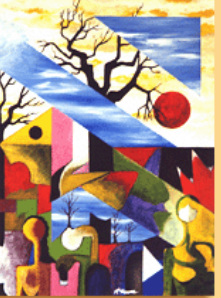 Paradise Lost by Christina McKenna
Paradise Lost by Christina McKenna Central to the story is her mother whose hopes and expectations as a young bride were soon dispelled in a marriage to a man who was demanding and domineering, incapable of showing love and offering no help in bringing up the 10 children they had together. This was not an easy life but a typical one for many women, not just in Ireland but also elsewhere and it continues for some women in some cultures today.
Nor did religion help for it was a religion of duty and fear and not one of love. At the end of her life " she died with the gathering awareness that she'd served her time; all the years of of pain had been 'offered up' over and over again. Paradise surely awaited her. She embraced death; she did not fear it. Her unhappiness had brought her to this pass" What an indictment on religion.
Offering things up might now belong to another age but it was common when I was growing up. When things were difficult or painful we were encouraged to 'offer it up' for the holy souls in purgatory or to earn a reward that we would finally reap one day in heaven. For me growing up the pain and sufferings were thankfully small and insignificant but not for Christina McKenna's mother. Offering her life up meant remaining within a loveless marriage, within the drudgery of keeping a household and looking after children with very little means to do so. This so called religious concept kept people in their place, encouraged them to think that they could not change their lot in life, taught them that their suffering and pain was somehow worthwhile and that it was worth suffering in this world as it would be alright in the end.
But like all religious concepts there is an element of truth in it, a truth that has often been abused by clerics and others in situations of power and control. Suffering is part of life and some of it is inevitable. We will all suffer illness and death, tensions within families and relationships, problems at work - all the stresses of what it means to be human and 'offering it up' can be a way of making sense of it, showing us how to cope with it and giving it some kind of purpose. But what are we offering it up for?
For Buddhists life and actions are 'offered up' for the good of all sentient beings. The intention is that each action becomes an act of compassion and love, a sacred act which contributes to the well-being of our world. Within Christianity there is the tradition of making a morning offering - offering and dedicating the actions of the day to the coming of God's Kingdom, a kingdom of justice, peace, reconciliation and wholeness. Offering up the day can transform mundane, daily actions into sacred ones which contribute to the flourishing of ourselves, our society and humanity. But to offer up our day for the good of all sentient beings or for the coming of God's Kingdom without working to make this effective in our daily lives is hypocritical. Once again Judaism has a lesson for us. For Jews life, both good and bad, is offered up to sanctify God's name. But ' offering up' is primarily a way of living. It is about doing good to others. It is serving God by refusing to stand still and do nothing in the face of injustice. This surely is what true religion is about.


 RSS Feed
RSS Feed
